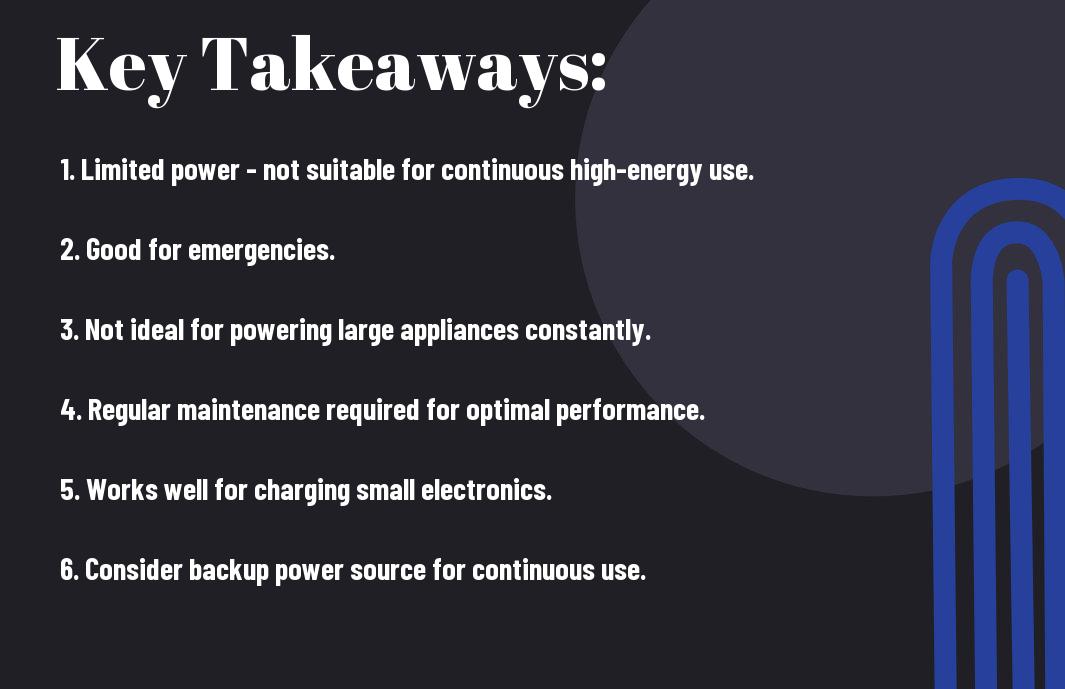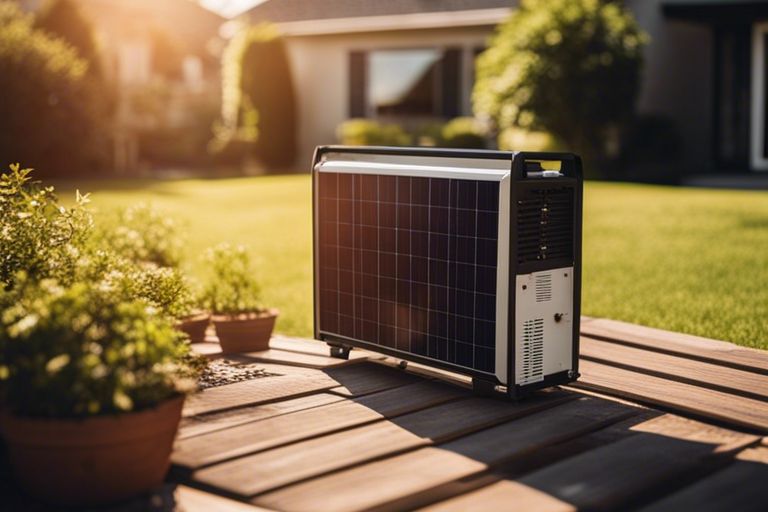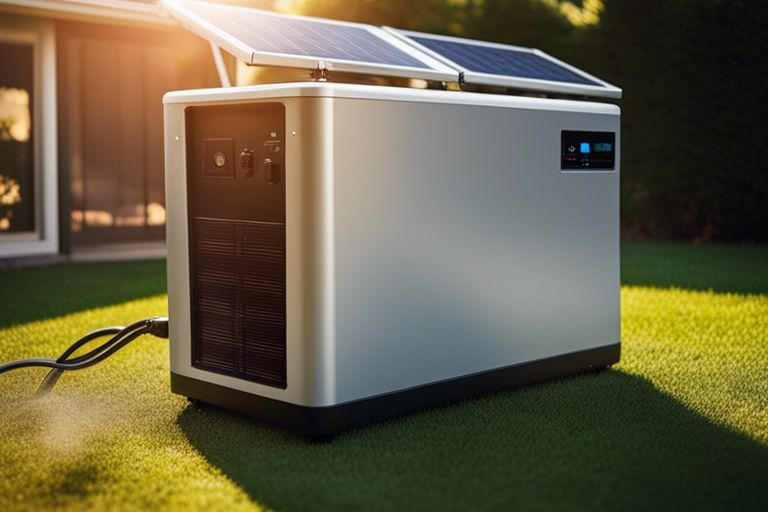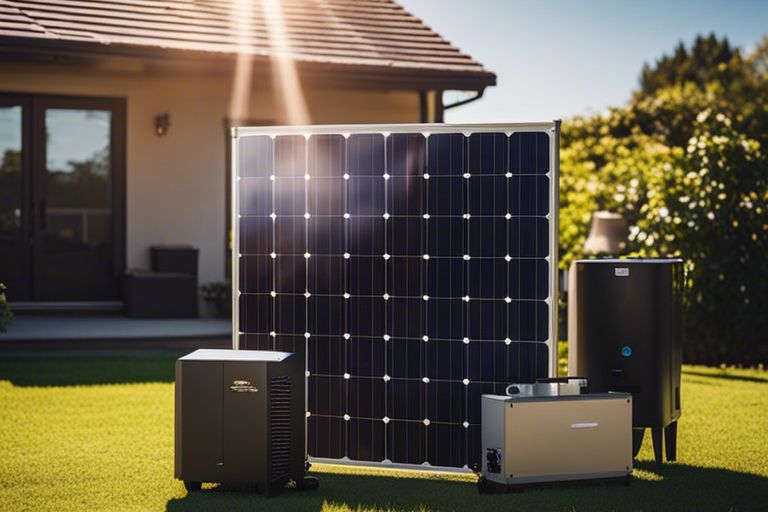Solar power seems like a limitless source of energy, but can you truly rely on a solar generator all the time? In this informative read, you’ll probe into the practicality and limitations of using a solar generator consistently. From understanding its output capacity to managing energy storage, discover how to optimize your solar generator usage for continuous power supply. Uncover the realities of depending on solar energy day in and day out, and pave the way for a sustainable energy solution that works for you.
Key Takeaways:
- Dependability: Solar generators are dependent on sunlight, so their effectiveness can vary based on weather conditions and daylight hours.
- Energy Storage: To use a solar generator all the time, you need a sufficient energy storage capacity to power your devices during nighttime or cloudy days.
- Power Consumption: It’s important to consider the power consumption of your devices to ensure that your solar generator can meet your energy needs consistently.
- Backup Power: Having a backup power source or alternative energy generation system is advisable for continuous and uninterrupted power supply.
- Maintenance: Regular maintenance of the solar panels and battery storage is crucial for optimal performance and longevity of the solar generator.
What is a Solar Generator?
Definition and Functionality
One of the most common renewable energy solutions, a solar generator harnesses the power of the sun to provide electricity for various applications. It consists of solar panels that capture sunlight and convert it into electricity through photovoltaic cells. This electricity is then stored in a battery for later use, making it a convenient and sustainable energy source for both indoor and outdoor activities.
Types of Solar Generators
A solar generator can come in different sizes and capacities to suit various power needs. Some are portable and designed for camping or outdoor events, while others are larger and can power an entire household. Recognizing which type is suitable for your needs depends on factors such as the amount of electricity you require and how you plan to use the generator.
| Functionality | Example |
| Portable solar generators | Goal Zero Yeti 150 |
| Home solar generators | Renogy Lycan Powerbox |
| Solar generator kits | Jackery SolarSaga 100W |
| Solar-powered backup generators | Kodiak Solar Generator |
| Solar generator with inverter | Anker Powerhouse 400 |
Recognizing the differences between these types can help you determine which one best fits your lifestyle and energy requirements. Importantly, it’s important to choose a solar generator that can reliably power your devices and appliances while being easy to maintain and operate.

Benefits of Using a Solar Generator
Environmental Advantages
Little changes can make a big impact on the environment. By using a solar generator, you are reducing your carbon footprint and moving towards a more sustainable lifestyle. Solar generators harness the power of the sun, a renewable energy source that does not produce harmful emissions like traditional generators powered by fossil fuels. For every hour you use a solar generator, you are contributing to a cleaner and greener future for our planet.
Cost-Effective
Using a solar generator is not only environmentally friendly but also cost-effective in the long run. While the initial investment may seem high, the savings you will accrue from not having to purchase fuel constantly will add up over time. Imagine never having to worry about rising fuel prices or power outages again. With a solar generator, you can enjoy a reliable source of power without breaking the bank.
Benefits
Portability and Convenience
Another advantage of using a solar generator is its portability and convenience. Whether you are camping in the wilderness or experiencing a power outage at home, a solar generator can provide you with power wherever you go. They are easy to set up and use, allowing you to have electricity on-the-go. You can power your devices, lights, and even small appliances with ease, making your outdoor adventures or emergency situations much more manageable.
Cost-Effective

Limitations of Solar Generators
Once again, while solar generators are a fantastic renewable energy source, they do have some limitations that you should consider before relying on them exclusively. These limitations can affect their ability to serve as a primary power source in certain situations.
Energy Storage Capacity
Any solar generator’s energy storage capacity is one of its main limitations. While it can harness energy from the sun during the day, its ability to store that energy for later use is limited. This means that if you have high energy demands or need power during the night when there is no sunlight, a solar generator may not be able to meet your needs.
Weather Dependence
Any solar generator’s performance is heavily dependent on weather conditions. Cloudy days or inclement weather can significantly reduce the amount of energy a solar generator can harvest, impacting its ability to provide consistent power. For instance, during the winter or in areas prone to frequent storms, you may experience periods of reduced energy production, affecting your power supply.
Initial Investment
To make the most of a solar generator, you need to consider the initial investment required. Setting up a solar power system, including the generator, solar panels, and installation costs, can be quite expensive compared to traditional power sources. While solar energy can save you money in the long run, the upfront costs may be prohibitive for some.
Weather, like cloudy days or long winters, can also affect the efficiency and output of solar panels, reducing the overall effectiveness of your solar generator as a primary power source.

Can You Use a Solar Generator All the Time?
Ideal Scenarios
After investing in a reliable solar generator, you might be wondering if you can use it all the time. In ideal scenarios, a solar generator can serve as a primary or backup power source for your home, RV, or outdoor adventures. As long as you have sufficient sunlight to recharge the generator’s batteries, you can enjoy continuous power supply without relying on the grid.
Real-World Limitations
Any system, however, has its limitations. In the real world, factors like weather conditions, limited sunlight hours, and energy demands can affect the continuous usage of a solar generator. Ideal for outdoor events or short power outages, a solar generator may struggle to meet constant high energy demands or during extended periods of low sunlight.
Ideal for short-term use and versatile power needs, a solar generator may not provide a feasible long-term solution for high-energy consumption or cloudy regions. To ensure uninterrupted power supply, consider a combination of solar generator and alternative power sources for a reliable energy backup plan.
Energy Demands and Supply
It’s vital to evaluate your energy demands and the solar generator’s supply capacity to determine if it can meet your power needs round the clock. Solar generators are designed to support small appliances, gadgets, and vital devices for short periods, making them suitable for recreational use or emergency situations.
Solar generators are convenient for charging phones, laptops, running lights, or small appliances, making them ideal for camping, outdoor activities, and temporary power outages. For continuous usage, assess your energy requirements and consider a solar generator with sufficient battery capacity and solar panel input to sustain prolonged use.
How to Optimize Solar Generator Usage
Many factors contribute to the lifespan and reliability of your portable solar generator. To ensure you are maximizing its potential, it’s imperative to understand how long portable solar generators last. For more information on this topic, you can check out How Long Do Portable Solar Generators Last?.
Energy Efficiency Tips
Optimize your solar generator’s usage by implementing energy-efficient practices. Start by placing your solar panels in direct sunlight to maximize their efficiency. Additionally, regularly clean your panels to ensure optimal performance. Consider investing in energy-efficient appliances and devices to reduce overall power consumption. Finally, monitor your energy usage and adjust accordingly to maximize your solar generator’s efficiency.
- Place solar panels in direct sunlight
- Regularly clean panels
- Invest in energy-efficient appliances
- Monitor energy usage
After implementing these energy efficiency tips, you’ll notice a significant improvement in the performance and longevity of your solar generator.
Load Management Strategies
An imperative aspect of optimizing your solar generator’s usage is managing the load efficiently. By distributing power usage evenly throughout the day, you can prevent overloading the system during peak hours. Consider using timers or smart devices to schedule power-intensive tasks during periods of high solar energy production. This strategic approach will help maintain a balanced power load and extend the lifespan of your solar generator.
Maintenance and Upkeep
Upkeep plays a crucial role in ensuring the long-term reliability of your solar generator. Regularly inspect and clean your solar panels to prevent dust and debris buildup, which can decrease efficiency. Check the connections and wiring for any signs of wear or damage and address them promptly. Additionally, keep your battery charged and maintained according to the manufacturer’s recommendations to prolong its lifespan.
Common Applications of Solar Generators
Keep in mind that solar generators can be used for a variety of applications. If you are interested in using a solar generator daily, you can find more insights on Using a solar generator daily on DIY solar forum. Here are some common uses for solar generators:
Off-Grid Living
Off-grid living is one of the most popular applications for solar generators. These systems allow you to live in remote locations without access to traditional power sources while still enjoying modern conveniences. By harnessing the power of the sun, you can generate electricity to power your lights, appliances, and electronic devices.
RV and Camping
Anytime you hit the road for an RV trip or go camping, a solar generator can be a handy companion. It provides you with a portable power source to keep your devices charged, run small appliances, or power lights at your campsite. With a solar generator, you can enjoy the great outdoors without worrying about running out of battery power.
Solar generators are lightweight and easy to transport, making them ideal for outdoor adventures. They are also quiet and produce no fumes, unlike traditional gas-powered generators, enhancing your camping experience.
Emergency Power Backup
Generators
In emergencies such as power outages or natural disasters, having a solar generator as a backup power source can be a lifesaver. Solar generators can keep your crucial devices running, such as phones, lights, and medical equipment, ensuring you stay connected and safe during unexpected disruptions in power supply.
To ensure you have power when you need it most, it’s crucial to keep your solar generator charged and ready for any unforeseen circumstances.
Conclusion
Conclusively, using a solar generator all the time may not be practical due to limitations such as weather conditions affecting solar panel efficiency, battery storage capacity, and power output constraints. While solar generators are a highly sustainable and eco-friendly option, they may not be suitable for continuous, uninterrupted power supply.
It is crucial to consider your energy needs, lifestyle, and backup power options when deciding on the usage of a solar generator. By understanding the advantages and limitations of solar generators, you can make an informed choice that best suits your requirements and contributes to a more sustainable energy future.
FAQ
Q: Can I use a solar generator all the time?
A: Yes, you can use a solar generator all the time as long as it has sufficient sunlight to recharge its batteries. However, it’s important to note that solar generators are best suited for powering small devices or appliances, and may not be able to sustain heavy power usage continuously.
Q: How long can a solar generator run continuously?
A: The continuous run time of a solar generator depends on factors such as the battery capacity, the amount of sunlight available for recharging, and the power consumption of the devices being powered. On average, a solar generator can run small devices for several hours to a day without sunlight.
Q: Can a solar generator power a whole house 24/7?
A: Solar generators are typically designed to power small appliances, devices, or emergency equipment rather than an entire house 24/7. To power a whole house continuously, you would need a larger solar energy system with more panels, batteries, and an inverter capable of handling the household’s power demand.
